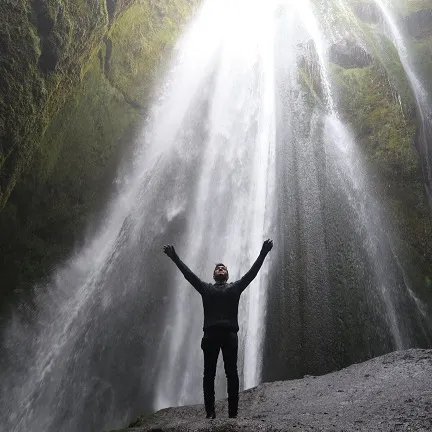Sure the nickname Golden State is due to the historic gold rush era of the mid-1800s, but it can easily be referring to the vast amounts of true golden experiences one can encounter when exploring California’s natural beauties. Magnificent mountain ranges in the Sierra Nevadas, the great salmon runs of the Klamath River, vast forests of giant sequoias dating back to primitive times, and immense desert oases filled with hidden canyons all are one state!
Exploring the third biggest state is not an easy task, especially with all its diversity, so we’re here to break it down for you.
Camping Tips: A Beginners Guide to their First Trip
Must visit National Parks:
There are 9 different National Parks inside California borders and visiting them all is a daunting task. Exploring each of these parks will grant you the opportunity to experience the vast diversity of landscapes in the state.
1. Yosemite National Park
No doubt you’ve heard about this park as it’s one of the crown jewels of America’s national park system. It’s too epic to leave off our list. Hikers can criss-cross more than 800 miles of trails to take in Yosemite’s dramatic scenery, including towering granite walls and giant sequoias. Be sure to head to Glacier Point as sunrise or sunset when the light turns the granite formations a rosy gold. Yosemite is often crowded in the summer but turns into a quiet snowy paradise in the winter.
2. Redwood National Park
Located in the northern coastal region of California, this park is home to 40% of the coastal redwoods left standing on our planet. You’ll find yourself in awe as you walk amongst these ancient, towering trees along trails next tranquil flowing streams. Get off the beaten path with a hike through Tall Trees Grove. If you have all day and want to take in the most that the park has to offer, including dipping your toes in the Pacific Ocean, then lace up for the 12-mile James Irvine to Fern Canyon loop trail.

3. Channel Islands National Park
The challenges to accessing this park offers up the reward of solitude, unplugging from distractions, and simply enjoying nature. This archipelago in southern California off the coast of Santa Barbara is home to more than 2,000 species of animals and plants, making this park a perfect place to spot some wildlife. Summer months bring humpback and blue whales to the warmer waters that are ideal for kayaking and diving adventures. Each of the 5 islands located in the park boundaries has a campground and scenic hiking trails with spectacular views. Known for spectacular sunsets, this park is often referred to as the “Galapagos of North America”.

4. Joshua Tree National Park
Nestled where two deserts meet, the Mojave and Colorado lie vast landscapes of behemoth boulders and diverse desert flora. The namesake Joshua trees thrive in this area and serve as the backdrop for photographers looking to capture ethereal sunsets. Rock climbers come from all over to scale these boulders but anyone can have fun scrambling around this natural jungle gym. Keys View is a favorite destination for its sweeping views of Coachella Valley and San Andreas Fault.
Additional Reading: Top 6 Reasons to put Joshua Tree National Park on your United States Bucket List
Must visit State Parks
National Parks usually get all the attention but state parks can be just as beautiful while offering equivalent activities and facilities. California’s state parks are home to over 300 miles of coastline, more than 600 miles of lake and river frontage, and a multi-use trail network of nearly 4,000 miles. These lands support a stunning array of the state's landscape provinces, environmentally sensitive habitat areas, threatened species, ancient Native American sites, and historic facilities.
1. Julia Pfeiffer Burns State Park
This stunning coastal park is home to one of the most photographed waterfalls in the state, McWay Falls. Monumental 3,000-ft cliff ridges, redwood trees, and panoramic views of the Pacific Ocean can be accessed by multiple trails that start right off the iconic Highway 1. Unfortunately, you are not allowed on the actual beach.

2. Calaveras Big Trees State Park
This park is an ideal place to see the giant sequoias of California while exploring a myriad of crisscrossing trails. The Stanislaus River that runs through the park offers up some great swimming holes during the warmer months and during the winter you can snowshoe hike in the North Grove. There are 129 campsites at two main campgrounds offering all the ingredients for a classic camping trip.
3. Point Lobos State Park
A showcase for the spectacular natural splendor of the Monterey Peninsula, this park is an absolutely stunning place for photography. Walk along Bird Island Trail to discover the sparkling jade-green waters of China Cove, on the park's most beautiful sights. The bay is home to gray whales, sea lions, and plenty of other aquatic animals, as well as a variety of seabirds. But not all of the sights are on land as it's a popular destination for scuba divers to come and explore the underwater landscapes of Monterey Bay.

4. South Yuba River State Park
A patchwork of lands stretching along a 20-mile stretch of the South Yuba River draws visitors with scenic swimming holes and rugged trails that hug buffs above the river. Independence Trail, the first identified wheelchair-accessible wilderness trail in the country, follows the route of Gold Rush-era mining flumes.
Essential Camping Gear Checklist
Must visit National Forests
Similar to the state parks, national forests also go unnoticed in California due to the epic National Parks. However, 20% of California is designated as National Forest land offering up a range of diversity of flora and fauna, as well as outdoor adventures. Did you know that these National Forests produce half of the state’s runoff water and many were created to preserve water supplies vital to the economic and environmental health of California?

1. Humboldt-Toiyabe National Forest
This forest’s spectacular 6.3 million acres make it the largest national forest outside of Alaska. Though only a small portion of it resides in California (a majority being in Nevada), it runs along the border of Yosemite and encompasses the Hoover Wilderness, an area of soaring peaks, lush meadows, and glistening lakes. One can also explore the Virginia Lake Basin on a 6.6-mile hike that passes many alpine lakes that are stocked with a variety of trout.
2. Angeles National Forest
Under an hour from the hustle and bustle of Los Angeles, is a diverse playground of natural wonders with developed campgrounds and picnic areas overlooking reservoirs. Miles of trails traverse the 700,000 acres accommodating hikers, bikers, horse-riding outfitters with elevations ranging from 1,200 to 10,064 feet. Test yourself with an 8-mile round trip hike to the summit of Mount Baden-Powell
3. Tahoe National Forest
You most likely have heard of Lake Tahoe, but you most likely didn’t realize that 850,000 forested acres are consisting of rivers, hidden waterfalls, and snow-capped peaks just waiting for you to explore. Mount Lola Trail is a challenging multi-day backpacking trip that summits the highest peak in the forest and offers panoramic views of the Sierra Divide. Cast your line in the Truckee River for some of the best trout fishing in the region.
Further Reading: 6 Must-do Hikes in Lake Tahoe
4. Plumas National Forest
Situated just south of the Cascade Range near Lake Oroville, this recreational hub attracts visitors year-round for its many streams and lakes, deep canyons, rich mountain valleys, and lofty peaks. The middle fork of the Feather River was one of the first nationally-designated Wild and Scenic Rivers. Close to 300 miles of trails are suited to every ability and camping options range from lakeside campgrounds to remote mountain stream hideouts. Feather Falls National Recreation Trail offers a wonderful destination for camping, hiking, and enjoying the beauty of the falls.
Camping Menu: Easy Meal Ideas for Every Camping Trip
Must visit desert parks
Believe it or not, California is actually home to three main deserts: the Mojave, Colorado, and the Great Basin. All of these are located in the eastern portion of southern California. Depending on the time of year, this region offers wonderful places for hiking, rock climbing, sightseeing, and stargazing.

1. Mojave National Preserve
This 1.6 million-acre park, located south of Death Valley National Park, is great for hiking, backpacking, and backroads camping. The Kelso Dunes are the highlight of this area and also the highest point, rising up to 700 ft above the desert floor! Hiking up to the top of the dunes will reward you with an epic view of Devil’s Playground. From the top, you then be able to slide down for a thrilling ride.
2. Death Valley National Park
This park is known for its harsh landscape and is home to the hottest, lowest, and driest in the United States. But don’t let the name fend you off, there is actually a lot of liveliness in this park. Hike through canyons, mountain bike along dirt path roads, explore black volcanic fields, and pitch your tent underneath a canopy of sparkling stars. Take a short hike along Father Crowley Vista trail for a peek at Rainbow Canyon, named for the bands of red and yellow volcanic rocks that stripe its 1,000-foot walls.
A visit to California should be on everyone’s bucket list. The state is full of pristine wilderness areas, iconic coastline cliffs, beautiful sandy beaches, and a vast array of wildlife. For those who already call it home, consider yourself lucky. Whatever your destination is inside the Golden State, you are sure to not be disappointed.
Additional Reading:
- 27 Must-see Parks in the Western United States
- 6 Must-do Hikes in Lake Tahoe for All Levels of Hikers
- Top 6 Hiking Destinations around San Francisco
For more great travel guides and all of our best content make sure you are signed up to our travel blog newsletter.




.avif)


























